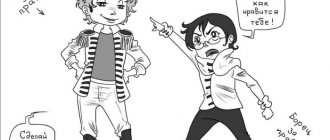Fantasy is a quality that anyone wants to have, since a person with imagination is able to creatively solve problems that arise before him, come out of ambiguous situations in an unconventional way, create something new, and creatively present himself to the world. When a person with imagination is adapted to society and knows how to think logically, he is highly effective. Creative people need imagination to give birth to images, embodying them in art.
Fantasy in psychology is an element of imagination, closely related to dreams. Therefore, a person who fantasizes a lot constantly wants something, strives for the objects of his dreams. He is often perceived by those around him as an innovator, an interesting conversationalist, because he is able to come up with new things and make every day different from the rest.
The word “fantasy” comes from a concept in Greek that denotes a phenomenon that has not yet existed in reality. If we fantasize, we form something new in our imagination. People with a strong ability to fantasize also have a strong idea; they change attitudes more easily and experiment, bringing their ideas to life.
What is fantasy?
Fantasy is a product of the imagination, characterized by the strength, vividness, spontaneity and uniqueness of the symbols, images or fantasies it creates. This is a superconcentration of ideas that stimulates learning, arouses a keen interest in everything that surrounds us, and a desire to know it all. According to this, the ability to imagine is the ability to create in the imagination something new, incredible, unimaginable, impossible or irrelevant. It's good that the storehouse of imagination is inexhaustible.
Without imagination, it would be difficult for a person to live with or create reality. After all, everything around us is the result of someone’s imagination, embodied in materials, designs, household appliances, transport, the Internet, books, paintings - in everything. Imagination as a personal quality is necessary for any process, but in creativity it is indispensable. That's why artists, writers, photographers, designers, dancers, stylists value this skill. More often, however, it is called creativity.
But the ability to dream is not only useful for creative people. Fantasies, slips of the tongue, free associations, wrong actions - all this is a direct path to the unconscious. And the unconscious is the subject of psychology. It is not for nothing that Sigmund Freud called fantasies “facades of dreams,” which reflect hidden thoughts, secret desires, and unrealized intentions. True, he recalled, they must be distinguished from reality.
And here lies the ambiguous benefit of fantasy. On the one hand, the development of fantasy increases the ability to create, expand, and double reality. But on the other hand, this is a way to avoid it. Sometimes fantasy becomes a way of life and somehow imperceptibly replaces an essential part of it. And here you need to be careful.
Where do unusual sexual fantasies come from 2
Most often, fantasies are generated by various books, films and stories. For example, the film “50 Shades of Gray” left few people indifferent. After watching this film, the number of girls dreaming of trying something similar has increased significantly. But there are also the most frank female fantasies that are born in your thoughts without any reason.
They can be a little strange and unusual. Their appearance may be associated with some experiences or memories of the past. Such memories can be both positive and negative, and this determines how unusual your fantasies can be.
Your preferences in sex and even how creative a person you are also play a role here. Simply put, there are a lot of factors and it won’t be easy to understand which one exactly caused certain fantasies in you.
Why do people need imagination and fantasy?
Some people mistakenly believe that imagination and composition are empty pursuits that have no application. But a well-developed imagination is the basis of creative thinking, which is so valued in modern society.
Think about it: we don't just follow our instincts. Instead, we dream, have ambitions, set goals and enjoy the beauty of life. You can't dream if you don't imagine the object of your dreams. So having imagination is what separates humans from animals.
Here are some reasons why imagination is a useful thing:
- Imagination allows you to grow. If you make plans only based on experience, you will not be able to change or create anything. Imagination expands your boundaries and allows you to set goals that you have not achieved before.
- Imagination helps you solve problems faster. Instead of trying to do “business as usual,” people with active imaginations come up with new strategies and solve problems faster. This is called creative thinking.
- Imagination leads to discovery. For example, Albert Einstein imagined a place where people could stop time and capture the best moments of their lives forever. Ultimately, these thoughts led him to the creation of the general theory of relativity, which changed humanity's understanding of time. And without imagination, people to this day consider time to be a fixed quantity.
- Imagination has given the world new inventions. Flying on an airplane, talking on the phone, having hot water in the bathroom - it all started with imagination. People wanted to fly like birds, talk to distant people, and not freeze in the bathroom. The list can go on for a long time. All these cool things around us exist thanks to our imagination.
- Any creativity begins with imagination. Without imagination and fantasy, there would be no Beethoven's music, no Marvel Cinematic Universe, and all the stories that begin with "Once Upon a Time." Have you seen an unusual, beautiful building? The architect saw this first in his imagination. Imagination and creativity are inseparable concepts.
- Imagination allows you to see beauty. Have you heard the saying “it works on the imagination”? Music, painting, beautiful view from the window, starry sky, golden trees in early autumn…. We perceive all these things through our imagination, which is why we see beauty. Let's put it this way: a person without imagination cannot look at a burning fire or flowing water for long. Although there are cats that can stare at one point for a long time. But I think it's something else.
A great example of a person with an active imagination is Stephen Hawking. In his imagination, he visited many corners of the Universe, exploring it and marveling at its splendor. Hawking's discoveries in the field of cosmology and quantum gravity were made directly from the wheelchair to which he was confined for most of his life. A person without imagination and fantasy is not capable of this.
Fantasy allows a person to search for the meaning of life and goals of activity.
Why develop imagination?
Compared to the process of remembering, imagination significantly increases neural activity. When a person imagines or remembers something that they have never actually seen, it is much easier to think creatively than to try to imagine something unfamiliar. Developed fantasy requires the inclusion of new neural connections, because in this case the brain cannot rely solely on connections formed by past experience.
To be effective and successful in the professional field, yesterday's knowledge alone is not enough. Imagination is important for everyone, especially for leaders, who not only must lead people into the future, but also anticipate the yet unknown challenges awaiting their team.
In addition, by developing imagination, a person develops his speech - an important skill necessary for everyone who is in society.
The secret ingredient that almost all successful people use is the ability to use imagination to their advantage. For example, geniuses Bill Gates and Steve Jobs boldly imagined how personal computers would change the world, allowing people to work, learn and communicate more effectively without leaving home [About my Brain, 2014].
According to a study published in the medical journal of the American Academy of Neurology, pursuing fantasy, creativity, and favorite activities well into old age can keep you sane and prevent dementia [CNN Health, 2015].
Researchers found that people who engaged in artistic activities such as painting and sculpture in middle and old age were 73% less likely to have problems with memory, thinking, and other cognitive impairments that lead to dementia.
The study found that those involved in crafts such as sewing, woodworking and ceramics were 45% less likely to develop cognitive problems in middle and old age.
Socializing with others or attending movies, concerts, book clubs and traveling reduced participants' risk of developing brain problems by 55%, while active computer and Internet use reduced participants' risk of developing brain problems by 53%.
The Mayo Clinic National Institute on Aging conducted the study over a four-year period with 256 patients with an average age of 87 years. The majority of patients who were involved in creative or active activities did not develop cognitive problems during the study [CNN Health, 2015].
"Do something that's different from your day job," said study leader Dr. Rosebud Roberts. “We know that doing a variety of things can stimulate brain activity. It not only enriches your life, but also brings you health benefits too. Engaging your brain in these myriad ways can not only protect neurons from dying, but also stimulate the growth of new ones" [CNN Health, 2015].
Imagination ignites passion. As an adult, a person finds himself in a world of responsibility and practicality, where money, status and work determine how he lives, relaxes and perceives the world around him. The need to develop imagination may arise from a deep desire to access the inner child, for whom creativity is the absolute norm.
Fantasy and imagination create the future. Many philosophers rightly believed that “thoughts become things,” and the “muscles of imagination” are exactly what makes this possible.
When a person is constantly immersed in his current reality, he constantly faces the same challenges, problems and experiences. In such conditions it is impossible to create something new and non-standard. But as soon as he focuses his imagination on the reality that he wants to change, energy begins to move, which, in turn, activates great and important changes.
Fantasy stimulates creativity and innovation. Some of the most influential and innovative creations arose from a simple fantasy of something bigger, lighter, and more beautiful.
Scientists and creative minds have the amazing gift of thinking outside the box and letting their imaginations run free. Many of these fantasies created products that completely changed the usual way of life. Without this creative power, humanity might never have had the Internet, smartphones, airplanes and other amazing technologies without which life today is unimaginable. Simply put, fantasy is the key ingredient for expanding and developing the boundaries of the world [Stanford News, 2014].
Fantasy adds magic to ordinary life. For example, a small child, using just his imagination, turns a simple box into a powerful rocket, a laundry basket into a pirate ship, and an ordinary bathtub into a deep sea full of treasures. Looking at the world through a child's eyes is enough to bring back the joy and wonder that imagination brings. How wonderful would the world be if everyone in it experienced joy in everyday things?
Sometimes fantasy helps protect oneself from harsh reality. It's hard enough to watch the news regularly and hear about violence, crimes, diseases and disasters. To maintain optimism and faith in the good, you need to be able to abstract yourself from what is happening and see the beauty in every day. By falling into the trap of “what is” and believing that this is how the world works, a person becomes a victim and gives up his true creative power [Nielsen, 2018].
You need to use the power of fantasy to give yourself hope. Because where there is hope, there is ultimately an opportunity for transformation and change.
How is imagination different from fantasy?
These days there is a stereotype that they are one and the same. However, to refute this, I will give a simple phrase: Tomorrow is built in the imagination of today's people, today's science is a fantasy from the past.
Imagination is the means that allows an idea to become a reality. When we talk about imagination, we rely on logical reasoning. Fantasy is freethinking; it may be unreasonable and contrary to common sense. However, fantasy and imagination are closely related, and any creativity without them is simply impossible.
This can be easily explained using the example of science fiction. Many science fiction writers are ahead of their time, introducing technologies that the world has never seen before. For example, Julius Verne's novel Twenty Thousand Leagues Under the Sea describes a submarine before the advent of real submarines. But this is not fantasy. The author specifically imagined the existence of such a ship in the real world.
Today it is science fiction about spaceships and the conquest of the universe. Space tourism is still in its infancy, and only Elon Musk promises us flights to Mars. But the authors of books like The Martian already have an idea of what this might look like from a scientific point of view. Such fiction is based on logic and common sense. That is why fiction is called science fiction, and people who understand physics demolish works in which the authors made up nonsense.
Fantasy, on the other hand, is not limited by laws and rules. That's all that comes to your mind. It's far from science, but it can lead to some really smart ideas. Imagination is used by all creative people. Instead of logic, artists and musicians need a fever of colors and unexpected turns. With age, many people stop fantasizing. This is why they say that creative people are big children.
To summarize: our ideas are born from fantasy, grow in our imagination and then become reality.
Fantasy in psychology
The ability to create something new, a state of consciousness leading to the emergence of original images, ideas, structures, is fantasy. This concept has nothing to do with fruitless dreams and building castles in the air.
The purpose of fantasy is to embody something that does not exist in real life, but has already been created by the imagination of the creator. This is how new approaches to existing phenomena arise, new forms for old content are born.
Fantasy is the sister of orderliness, integrity, completeness. To prove this, it is enough to remember how the poet creates. From the chaos of disparate legends, beliefs, visions, ideas, he creates a single work with a harmonious composition.
Imagination and age
Childhood is not the only period in which imagination develops. It goes through several stages:
- Childhood;
- Transitional age;
- Adolescence.
Each of these three periods has its own characteristics and incentives.
In childhood, a child becomes acquainted with the world as such. Template thinking has not yet been formed. Everything happens for the first time, everything is new, everything arouses curiosity. At this age, the brain works very quickly. This is how nature intended. At the same time, the child has no knowledge about the world around him.
A teenager thinks differently. He is looking for his place in the real world. His imagination is based on the present, but at the same time he paints pictures of the future. Dreams become an important part of their thinking. Sometimes crazy and naive, but already rational.
Growing up presents a different challenge. And he himself is already different - more or less established views, more stable, more erudite. He can look into the distance and think creatively and freely, without restrictions. In adulthood, this ability may weaken under the influence of unfavorable circumstances.
Human fantasy: modern methods of study
To recognize creativity and determine originality, the following methods are used:
- Unconventional use or interpretation of objects. The subject must invent several ways to use everyday objects in unusual ways or interpret unclear images.
- Anticipating results. The test taker describes the consequences that can be expected due to a change in a particular situation.
- Title for the story. The person is asked to come up with several original titles for the story they read.
- Rorschach test. The task for the subject is to present unique interpretations of ink blots.
- TAT. The individual is shown several pictures and asked to interpret them, compose a story based on them, and come up with a solution to the situation depicted.
- Anagrams. It is necessary to create rarely used lexemes from the letters that are part of the given word.
- Writing a story. It is necessary to come up with a narrative that would include the maximum number of words from the proposed 50 adverbs, adjectives and nouns.
- Shulman test. Closed spaces should be found in complex forms.
All of these tests are based on a view of creativity as an illogical process. The test results reveal originality of thinking, sensitivity to novelty, and sensitivity to difficult problems.
Fantasy and reality
The common belief that fantasy is completely divorced from reality is wrong. Firstly, any fantasy can only be based on impressions of reality, that is, on what a person perceives.
By the way, many scientists saw the results of their many years of research precisely as a flash of imagination, as an insight. Thus, fragmentary puzzles of perception are assembled into a holistic picture, view, gestalt. And this possibility of imagination is also important.
For example, a child learns lesson after lesson about the features of some great event. He learns about what preceded this, what kind of people lived then, how they dressed, what habits and customs they had, how they built and developed. All this must come together into a picture, and this is a task for the imagination. This form of work becomes possible thanks to the experience of other people, the experience of society and expands the personal experience of the child and adult.
Creative imagination
It is impossible to write a poem or derive a mathematical formula without imagination. It is an indispensable condition for the activity of the creator. A writer, scientist, musician, artist always has insufficient information or no information at all to construct an image or scientific model.
Thus, a battle writer has to create a historical novel based on individual archival documents, supplementing and connecting them with his imagination. The more actively his imagination is involved in the work, the stronger and more vivid the impression of the work will be.
To qualify as a creator, you must have a number of specific qualities:
- flexibility and ease of thinking;
- high speed of mental operations;
- breadth of approach to problems;
- freedom of choice;
- skeptical attitude towards generally accepted opinions;
- sensitivity to novelty, the ability to discover it in ordinary things;
- alienation from imitation and plagiarism;
- tendency to make unpredetermined decisions;
- nonconformism, willingness to defend new ideas.
Mechanism of work: what, how, why and why?
Human mental activity occurs in two modes:
- Concentrated - mental effort is aimed at completing a specific task, and all the resources of short-term memory are involved in this process.
- Distracted - attention and effort are not focused on anything specific and lack motive. In this case, a person is engaged in routine tasks that are brought to automatic mode: cleaning, running, cooking while watching TV.
Miracles of fantasy are born in a distributed mode. The brain worked in collected mode. He collected and packaged information from gift sites and uncovered secret archives of memories. Then it's better to give him a rest. During rest, new information is processed and new connections are created between neurons. When everything is ready, the discovery comes naturally - non-standard and useful.
To understand how fantasy works, let's look at research conducted by neuroscientists at the University of California. Imagine the human brain, made up of billions of neurons. This is a library of experience and knowledge that is replenished throughout life. This is a repository for all the little things. This is a repository of everything forgotten and unconscious. And even a hastily looked through picture book will take its place in the neuron storage. Some library halls are always open, others are ajar for a moment, others are hidden behind wrought iron bars and heavy sign locks.
Every second consciousness accesses this repository of information. Having received a request, the brain uses working memory reserves and directs its thought process along a well-worn path to the group of neurons in which the requested information is stored. For example, if you want to solve an equation, your brain will direct you to those neural connections that store the algorithm for this action. The more familiar and routine the task, the faster the solution comes.
But what happens when a person sends an unconventional request to his subconscious? Accustomed to routine monotony, working memory directs thinking along well-trodden paths. The answer you get is either very ordinary or completely wrong. The situation is familiar to everyone. Example: February 23 and choose a gift for your loved one. What is the first thought that comes to his or her mind? Socks! Perhaps shaving foam, a penknife, underwear, deodorant. 90% of girls go through this list. This is where the need to think creatively arises. It would seem like a small thing, but how many problems and heartache?
What happens in the head of a person endowed with the gift of magical imagination?
- The first options are discarded,
- the request changes from “What to give?” on “Unusual gifts for February 23”,
- new schemes are launched, new solutions are proposed.
If the ideas are not satisfactory, the request is changed again, and so on until the desired result is achieved. No one knows through which corners of the subconscious a thought will pass. It all depends on the number of connections. While looking for gift ideas, a girl will come across her lover’s hobbies; she will remember an admiring Mr. Corkscrew or a collectible bottle of wine. She will remember his love for cars and strange air fresheners, about his dreams of playing golf or skydiving... At this moment, it is better to change the situation and think about something else.
According to statistics, children fantasize more and more often than adults.
Human fantasies and dreams
Z. Freud investigated the causes of neuroses and came to the conclusion: our unconscious sphere is one of the sources of fantasies. The father of psychoanalysis carried out painstaking work studying the dreams of clinic patients. It was established: night fantasies, representing the illusion of the fulfillment of cherished desires, act as “guards” of sleep, ridding it of unnecessary stimuli.
Dreams reflect both external reality and mental experiences that are not conscious to the individual. In the images of night pictures, accents often shift and colors thicken. Symbolism plays a big role in them. The same thing happens in the ravings of a psychopath, the whims of a neurotic, a poetic work, mythical fictions, intimate dreams, religious beliefs.
The exit from the deep layers of the psyche into the sphere of consciousness occurs according to the principle of projection. Just as a child realizes his desires in games, so the aspirations of adults find expression in dreams, delirium, dreams or works of art.
Problems of imagination
Problems arise not when a person uses his imagination, but when he treats it in a special, one might say painful, way. For example, magical thinking.
In the Great Encyclopedia of Psychiatry you can read that magical thinking is, in its most general form, the belief that we can influence reality with our thoughts, fantasies and desires. Being a normal phenomenon, it is to a certain extent characteristic of children under 3-5 years of age, who believe that their thoughts are the cause or analogue of what is happening in external reality, as well as representatives of “primitive” cultures.
Magical thinking structures in some people coexist alongside other, later, more developed and complex cognitive programs. Thus, the orthodox mind may combine an incompatible belief in divine providence and the belief that a person can magically control the circumstances of his life and use, for example, the power of thought or mental image to control reality.
Imagination - what is it like?
Research
In fact, you can’t even imagine how many scientific works have been written on this topic!
Moreover, venerable candidates and professors from pedagogy and psychology do not tire of endlessly developing this topic.
Almost all research in the field of children's imagination is aimed at finding new methods for its development, and how to speed up this process. Because everyone can’t wait to cram as many “useful things” into the child’s head as possible.
Finally, there are some unshakable definitions: types of imagination and its development at different ages of the child. And in order to move on, you need to understand these concepts.
Types of fantasy
Everything is simple here. Since young children do not have significant experience or knowledge in any areas. Therefore, all that they can fantasize about is either what was told by adults (other children) or what they read in children's books. Here is the simplest division of such fantasies:
- passive - something that will never come true (dreams, daydreams);
- active - something that needs to be implemented (in cases with children, this needs to be implemented right now);
- creative - not just a repetition of ideas already embodied by someone, but created independently;
- reproductive - using other people's ideas in one's own interpretation.
An example of reproductive fantasy is reincarnation into a fairy-tale character. This often happens after reading a book or watching a cartoon.
At the same time, a child, playing any hero, only first takes the prototype of his character.
Then he adds so much of his own and new things that the parents are only surprised: “where does it come from, the fairy tale was about something completely different!”
Categories of imagination
So, in this matter we are primarily concerned with the development of the active variety of imagination. And it is at one time divided into several categories:
- verbal - based on speech (inventing new words, selecting similar ones to already familiar ones, etc.);
- non-verbal – fantasies based on what has already been seen;
- musical – the ability to bring to life or verbally describe musical images;
- emotional – to embody or describe, transform into reality the emotional component of images and experiences;
- motor – the embodiment of fantasy forms using plastic movement.
In fact, the latter subtypes are quite conventional, for example, in a motor form (dance) one can express musical, emotional and any non-verbal images.
All of the above is a brief theory. It is not necessary to memorize it, but it gives us basic concepts that will be useful in the future.
What kind of fantasies are there?
Fantasy is such a broad topic that it is impossible to consider it from all sides at once. Let's talk about the most popular ones.
Unconscious
Sometimes you can hear the reproach: “You are completely unimaginative.” In fact, there are no people incapable of imagination. Fantasies just arise unconsciously. Freud's psychoanalysis explains them in two ways: a) they initially arose in the unconscious; b) they arose in consciousness, but fell into the unconscious through suppression.
- Pros. This is a key concept in psychoanalytic theory and can help you learn a lot about yourself.
- Cons. If left uncontrolled, it can cause psychological and psychosomatic disorders or delusions.
Children's
Children's imagination is active from 3-3.5 years old and has no boundaries. Children come up with imaginary friends, plots for games, new stories for their favorite book or cartoon characters. In this way, they explore the world, learn to behave and communicate in the real world, form psychological defense mechanisms, and open up creatively.
- Pros. Imagination and creativity help them discover their uniqueness and talent, relax and just have fun.
- If a child is not taught the difference between fantasy and lies, he may grow up to be a pathological liar.
Scientific
Innovation is not just a fantasy. This is a revolution that makes it possible to go beyond the right answers and find a truly new solution. The combination of imagination and scientific thinking has led to the emergence of robotic surgeons, cellular communications, bioprosthetics, artificial intelligence, flexible smartphones, 3D printing and virtual reality.
- Pros. New trends in the world of innovation and creativity are expected - technological cities of the future, invincible quantum computers, 4D and 5D printing, robots capable of teaching, and a new generation of driverless cars.
Writing
The depth of the writer’s imagination allows the reader to travel in time and space, enter the artistic world of the characters, and observe fascinating events from the past and future. Books bring so many wonderful things, knowledge, emotions, advice, adventures into the lives of readers that one can only rejoice at such a rich imagination.
- Pros. Reading is the very form of leisure that brings the greatest feeling of happiness and satisfaction with life.
Erotic
Sexologists joke: 90% of people indulge in sexual fantasies, and the remaining 10% simply do not admit it. A night with an ex-partner, sex with a celebrity or a stranger, sexual games in nature or in an unfamiliar place - these erotic dreams help to “paint” a not very happy picture of reality.
- Active fantasies about sex allow you to weaken internal inhibitions, express and realize repressed desires.
- Too realistic and unrealized erotic fantasies can lead to sexual perversion. They also have a destructive effect on relationships. Especially if partners try to play them on the side.
Neurotic
The neurotic's frightening fantasies cause fear of an imagined future. These may be exaggerated fears of death, fears of a comet or falling house, fears of incurable diseases, perverted obsessions. All this has no basis in the present tense, but causes great discomfort to the neurotic.
- Suffering, emotional instability, uncertainty - all this is part of the personality of a neurotic. Obsession with one’s terrible illusions poisons the neurotic and everyone around him.
Fantasy (C.G. Jung)
Fantasy. By fantasy I mean two different phenomena, namely: firstly, phantasm and, secondly, imaginative activity. From the text of my work in each given case it follows in what sense the expression “fantasy” should be understood. By fantasy in the sense of “phantasma” I understand a complex of ideas that differ from other complexes of ideas in that it does not correspond to any external real objective data. Although initially fantasy may rest on recalled images of actual experiences, its content does not correspond to any external reality, but remains essentially the output of the creative activity of the spirit, the activity or product of a combination of psychic elements occupied by energy. Since psychic energy can be subject to arbitrary direction, fantasy can be evoked consciously and voluntarily, both in general and at least in part. In the first case, it is then nothing more than a combination of conscious elements. However, such a case is an artificial and only theoretically significant experiment. In everyday psychological experience, fantasy in most cases is either caused by a wary intuitive attitude, or is an intrusion of unconscious contents into consciousness.
One can distinguish between active and passive fantasies; the first ones are caused by intuition (see), i.e. an attitude (q.v.) aimed at the perception of unconscious contents, and the libido (q.v.) immediately occupies all elements emerging from the unconscious and brings them, through the association of parallel materials, to complete clarity and visibility; passive fantasies appear immediately in a visual form, without a preceding or accompanying intuitive attitude, with a completely passive attitude of the cognizing subject. Such fantasies belong to mental “automatisms” (Automatismes, Janet). These latter phantasies can, of course, appear only in the presence of relative dissociation in the psyche, because their emergence requires that a significant part of the energy evade conscious control and take possession of unconscious contents. So, for example, Saul’s vision suggests that unconsciously he is already a Christian, which was hidden from his conscious understanding, insight.
Passive fantasy always arises from some process in the unconscious, opposite to consciousness, a process that contains approximately the same amount of energy as in the conscious attitude, and which is therefore capable of breaking through the resistance of the latter. On the contrary, active fantasy owes its existence not only and not one-sidedly to an intensive and opposite unconscious process, but also to the tendency of the conscious attitude to perceive hints or fragments of relatively weakly emphasized unconscious connections and, transforming them through the association of parallel elements, bringing them to complete clarity. So, with active fantasy, the matter does not always come down to a dissociated state of mind, but rather to the positive participation of consciousness.
If the passive form of fantasy often bears the stamp of the painful or at least abnormal, then its active form often belongs to the highest manifestations of the human spirit, since in it the conscious and unconscious personalities of the subject merge in one common unifying work. Fantasy, formed in this way, can be the highest expression of the unity of a certain individuality and even create this individuality precisely with the help of the perfect expression of its unity (cf. the concept of “aesthetic mood” in Schiller). Apparently, passive fantasy is usually never an expression of the achieved unity of individuality, since it, as already said, presupposes a strong dissociation, which, for its part, can only rest on an equally strong opposition between consciousness and the unconscious. Fantasy, arising from such a state through an intrusion into consciousness, can therefore never be a perfect expression of the unified individuality, but will be primarily an expression of the point of view of the unconscious personality. A good example of this is the life of Paul: his conversion to the Christian faith corresponded to the adoption of a hitherto unconscious point of view and the repression of the previous anti-Christian way of thinking, which later revealed itself in his hysterical attacks. Therefore, passive fantasy always needs conscious criticism if it is not to one-sidedly give way to the point of view of the unconscious opposite. On the contrary, active fantasy as a product, on the one hand, of a conscious attitude, which is by no means opposed to the unconscious, and, on the other hand, of unconscious processes, which are also not opposed to consciousness, but only compensate for it, needs not criticism, but understanding.
Both in a dream (which is nothing more than a passive fantasy) and in fantasy, one must distinguish between obvious and hidden meaning. The first is revealed from the direct contemplation of a fantastic image, this direct manifestation of a fantastic complex of ideas. Of course, the manifest meaning hardly deserves a name - in fantasy it always turns out to be much more developed than in a dream - this should probably stem from the fact that the dream fantasy usually does not need special energy in order to effectively resist the weak resistance of the sleeper consciousness, so that little opposing and only slightly compensating tendencies can reach perception. On the contrary, the waking fantasy must already have considerable energy in order to overcome the inhibitory resistance emanating from the conscious attitude. For the unconscious opposite to reach consciousness, it must be very important. If this opposition consisted only of vague and difficult to catch hints, then it would never be able to capture attention, that is, conscious libido, enough to break through the connection of conscious contents. Therefore, the unconscious content is chained to a strong internal connection, which is precisely expressed in the developed explicit meaning.
Explicit meaning always has the character of a visual and concrete process, but the latter, due to its objective unreality, cannot satisfy the consciousness that claims to understand. Therefore, it begins to look for another meaning of fantasy - its interpretation, that is, its hidden meaning. Although the existence of a hidden meaning in fantasy is at first not at all certain, and although it is quite possible to dispute even the very possibility of a hidden meaning, yet the claim to a satisfactory understanding is a sufficient motive for careful investigation. This search for hidden meaning may at first have a purely causal nature, when raising the question of the psychological reasons for the emergence of fantasy. Such a formulation of the question leads, on the one hand, to the reasons that caused the fantasy and lie further, behind; on the other hand, to the determination of those drives and forces that should be energetically held responsible for the emergence of fantasy. As is known, Freud developed this direction particularly intensively. I called this kind of interpretation reductive. The right to reductive understanding is clear without further explanation, and in the same way it is quite clear that this method of interpreting psychological data gives some satisfaction to people of a certain temperament, so that any claim to further understanding disappears. When someone gives a cry for help, the fact will be sufficiently and satisfactorily explained if we can prove that the person's life is at that moment in danger. If a person dreams of a table laden with food and it is proven that he went to bed hungry, then this explanation of the dream is satisfactory. If a person who represses his sexuality, for example a medieval saint, has sexual fantasies, then this fact is sufficiently explained by the reduction to repressed sexuality.
But if we wanted to explain Peter's vision by reference to the fact that he was starving and that therefore the unconscious urged him to eat unclean animals, or that eating unclean animals in general is only the fulfillment of a forbidden desire, then such an explanation gives little satisfaction. Likewise, our request will not be satisfied if we want to reduce, for example, the vision of Saul to his repressed envy, which he harbored for the role of Christ among his countrymen and through which he identified himself with Christ. There may be some truth in both of these explanations, but these explanations have nothing to do with the psychology of Peter or Paul, conditioned by the spirit of their times. This explanation is too simple and cheap. One cannot interpret world history as a problem of physiology or as a matter of personal scandalous chronicle. This point of view would be too limited. Therefore, we are forced to significantly expand our understanding of the hidden meaning of fantasy, primarily in the sense of causality: the psychology of an individual person can never be exhaustively explained from himself, but we must clearly understand that his individual psychology is determined by contemporary historical circumstances and how. It is not only something physiological, biological or personal, but also a certain problem of the history of that time. And then, no psychological fact can ever be fully explained from its causality alone, because as a living phenomenon it is always inextricably linked with the continuity of the life process, so that, although it, on the one hand, is always something that has become, on the other hand , it is still always something becoming, creative.
The psychological moment has the face of Janus: it looks back and forward. As he becomes, he prepares the future. Otherwise, intention, assignment, goal setting, taking into account the future and foreseeing it would be psychologically impossible. If someone expresses an opinion and we attribute this fact only to the fact that before him someone else expressed the same opinion, then this explanation is practically completely insufficient, for we want to know not just the reason for this action in order to understand it, but also what he means by this, what is his goal and intention and what he wants to achieve by this. Having learned all this, we usually feel satisfied. In everyday life, without further reasoning and completely instinctively, we add to this an explanation from a final point of view; very often we even consider this final point of view to be decisive, completely leaving aside the moment that is strictly causal, obviously instinctively recognizing the creative moment of the psychic being. If we act this way in everyday experience, then scientific psychology must also take into account this state of affairs and therefore should not take exclusively a strictly causal point of view, which it initially borrowed from the natural sciences, but should also take into account the final nature of the mental.
And so, if everyday experience affirms as an undoubted final orientation of the contents of consciousness, then from the very beginning there is no reason to reject this in relation to the contents of the unconscious, of course, until experience reveals the opposite. In my experience there is no reason to deny the final orientation of unconscious contents; on the contrary, there are many cases in which a satisfactory explanation is achievable only by introducing a final point of view. If we consider, for example, the vision of Saul from the point of view of Paul's world mission and come to the conclusion that Saul, although consciously persecuting Christians, unconsciously accepted the Christian point of view and became a Christian due to the preponderance and invasion of the unconscious, because his unconscious personality strived for this goal, instinctively comprehending the necessity and significance of this act, then it seems to me that such an explanation of the meaning of this fact will be more adequate than a reductive explanation with the help of personal moments, although the latter, in one form or another, undoubtedly participated in this, for “too human” is present everywhere. Likewise, the hint given in the Acts of the Apostles to the final explanation of Peter's vision is much more satisfactory than the assumption of physiological-personal motives.
So, putting everything together, we can say that fantasy should be understood both causally and ultimately. For a causal explanation, it is a symptom of a physiological or personal state that is the result of previous events. For a final explanation, fantasy is a symbol that tries to designate or grasp, with the help of available material, a certain goal or, rather, some future line of psychological development. Since active fantasy constitutes the main sign of the artistic activity of the spirit, then the artist is not only an artist, but a creator and, therefore, an educator, for his creations have the value of symbols that outline the lines of future development. The more limited or more general social meaning of symbols depends on the more limited or more general vitality of the creative individuality The more abnormal, that is, the more unviable the individuality, the more limited the social meaning of the symbols created by it, even if these symbols had absolute meaning for a given individuality
The existence of a hidden meaning in fantasy can be disputed only by those who believe that the natural process is generally devoid of a satisfactory meaning. Meanwhile, natural science has already identified the meaning of the natural process in the form of the laws of nature. It is recognized that the laws of nature are human hypotheses established to explain the natural process. But since it has been verified that the established law is consistent with the objective process, we have the right to talk about the meaning of what is happening in nature. And since we manage to establish the pattern of fantasies, we have the right to talk about their meaning. However, the meaning found is only satisfactory, or, in other words, the established pattern only deserves this name when it adequately conveys the essence of fantasy. There is a regularity in the natural process and a regularity in the natural process itself. It is natural, for example, that a person sees dreams when he sleeps, but this is not a regularity that says something about the essence of dreams. This is a simple dream condition. Establishing the physiological source of fantasy is only a simple condition for its existence, and is by no means the law of its essence. The law of fantasy, as a psychological phenomenon, can only be a psychological law.
We now come to the second point of our explanation of the concept of fantasy, namely the concept of imaginative activity (imaginative Tatigkeit). Imagination is the reproductive or creative activity of the spirit in general, without being a special ability, for it can be carried out in all basic forms of mental life, in thinking, feeling , sensation and intuition. Fantasy, as an imaginative activity, is for me simply a direct expression of mental life activity, mental energy, which is given to consciousness only in the form of images or contents, just as physical energy manifests itself only in the form of a physical state that physically irritates sense organs. Just as any physical state from an energetic point of view is nothing more than a system of forces, in the same way mental content from an energetic point of view is nothing more than a system of forces appearing to consciousness. Therefore, from this point of view we can say that fantasy in as a phantasm, there is nothing more than a certain amount of libido, which can never appear to consciousness except in the form of an image. Phantasm is an idea force. Phantasizing, as an imaginative activity, is identical with the flow of the process of psychic energy.
Quoted from: Jung K. Psychological types. St. Petersburg, M., 1995, p. 571-578.
What is escapism?
Escapism is a synonym for escape, no matter where: work, sex, art, life, religion, remote villages, monasteries, conversations on the forum, games, intoxication or psychotropic substances. Against the background of such “interests,” escaping into a fantasy world looks harmless. But this is only at first glance.
The world invented by fantasy looks more attractive than reality. It is the latter that saves the psyche from destruction. But gradually such “mind games” replace the real world with an imaginary one. When the boundary between illusion and reality weakens, self-control, a sense of responsibility for one’s life, and the desire to improve something and achieve something disappear. Therefore, degradation, descent into psychosis or the development of personality disorders are possible. And this is already a diagnosis.
What to do in such a situation? Step back and look at it from the outside. In fact, a far-fetched illusion only becomes a powerful force when it motivates action. It is important to distinguish between different forms of fantasy:
- Sweet dreams are like “rose-colored glasses” in which there is no room for reality - not a very good sign.
- Fantasies that charge you with energy and move you forward are useful.
There is one more secret: turning fantasies into reality is much more interesting than fantasizing about nothing.
HOW TO EXPLAIN THE UNEXPLAINABLE
Since childhood (from the childhood of humanity and from our personal childhood), we have to somehow correct this unsatisfactory situation. Haeckel’s law, disliked by modern biology (“ontogenesis is a brief repetition of phylogeny”), seems to be playing out here, on a foreign site, in full force. Our ancestors easily turned unknown and inexplicable things and phenomena into funny, scary, friendly or dangerous, but always outlandish entities.
They did this, undoubtedly, in the interests of the integrity of the observed world and the preservation of cause-and-effect relationships in it. Thunder rumbles because Elijah the prophet is riding in a chariot. In the forest, a goblin confuses the paths, Baba Yaga flew across the sky with a lantern in a mortar, a drowned man was dragged away by a mermaid, and kikimoras braided the horse’s mane...
Our children are doing exactly the same thing today. “Who's knocking there? “Babai lives behind the wall.” “Why is the curtain swaying so strangely? “There’s a ghost standing there.” An explosive mixture of primitive explanations and sweet metaphysical horror, just like our ancestors. Sometimes, in its pure form, it is the fruit of an uncomplicated child’s imagination.
From my practice. A five-year-old child asked: “Why do they smear iodine on a scratch?” They answered him: “To kill germs.” And they didn’t explain anything else. “Why does iodine sting? - thought the child. - After all, if you wash it with water, it won’t hurt. Yeah! (A consistent fantasy picture began to form.) Water does not kill microbes, but iodine kills them. Microbes are something living (since they die), such very small harmful animals. And so, when they die, they, in their final anger, cling to your hand with their little teeth. That’s why it hurts (the picture was completed).”
How to develop imagination and fantasy in adults
Imagination is an ability that is innate to every person. Therefore, it does not need to be taught, it just needs to be nourished.
To develop your imagination, you simply need to engage in activities that stimulate it. Below is a list of recommendations that, in my opinion, are the simplest and most effective.
Turn off the TV and find a hobby
Watching TV is a common way to relieve stress after a hard day at work. I myself like to watch a few episodes of TV on the weekend or before bed. But this is a way of passive relaxation, in which the brain is inactive.
Instead of constantly observing other people's lives, find a hobby that allows you to create your own story.
Pay attention to funny little things
Try to find strange and funny things where there are none. Funny combinations of inscriptions on nearby billboards, bizarre shapes of clouds, funny gait of a pigeon. All of these things require imagination and can make your life a little more fun (a nice bonus).
Try doing nothing
Our mind is constantly in a noisy environment due to external stimuli. This could be the same TV, music, constant social networks and notification feed. Try sitting in silence and listening to your own thoughts. Sometimes you can be amazed by the ideas and insights that come to mind when you are not distracted.
Listen to music without words
Listening to music has been proven to improve productivity at work. But if these are songs with lyrics, then we subconsciously listen to their ideas, leaving our own. I myself have noticed that even songs in a language I don’t know can unsettle me. On the other hand, music without lyrics stimulates the imagination and gives the green light to new ideas.
How to develop imagination?
If you believe that the ability to fantasize, as well as creative thinking, is the lot of gifted people and it is impossible to develop them, then you are mistaken. Imagination is a skill that can and should be developed. The online program “TRIZ in Practice” will open new facets of your thinking and develop hidden creative potential in just 4 weeks. After going through it, you will understand that all boundaries are only in your head and that there are no barriers to imagination.
And in addition to the online program, we have prepared for you a list of recommendations on how to better develop and train your imagination and imagination.
Turn off the TV
Watching television programs is a form of passive participation. TV may be good for relaxing after a hard day, but not for developing the imagination. Instead of watching other people's interesting lives, find something to do that will enrich your life.
Often, in order to awaken your imagination, you need to clear your head of the information noise received throughout the day. Take at least 15 minutes a day to disconnect from external stimuli and impulses. Turn off the music and TV, put your phone aside and sit in complete silence.
Calmly observe what exactly comes to your mind. Don't try to analyze these thoughts, but simply allow them to pass through your consciousness and boldly let them go. If you find it difficult to disconnect from the flow of thoughts on your own, start practicing meditation using video lessons on the Internet.
Read creative literature and watch creative films
By reading fiction, a person develops imagination. And by reading genres that are unusual for him, he not only expands his consciousness and horizons, but also gets rid of information bubbles.
The same principle lies in any form of art. Try to discover new musical styles, master unfamiliar types of creativity, watch unusual film genres.
Reading any literature in itself develops imagination. However, you can strengthen and consolidate this skill by changing literary styles. If you usually read detective thrillers, read a fantasy novel or romance novel. Look for experimental or independent films that challenge cinematic standards. Try to expand not only the content you interact with, but also the way you present it.
Instill in yourself a taste for novelty. Explore works of art, read books that develop imagination, study the results of other people's imaginations, find out how other people realized their ideas.
Listen to music without words
Scientists have proven that listening to music increases productivity while working. However, listening to texts forces a person, at least subconsciously, to focus on their meaning.
Play classical music or nature sounds and let them spark your creativity. Complete the images that come to your mind in your imagination. You can also combine listening to music with art therapy.
Keep a diary
In addition to the therapeutic benefits, journaling allows you to develop your imagination. If you have a hard time writing about something that doesn't exist, start simply writing about your day. Gradually add as much detail and nuance to your descriptions as possible.
Later, having gotten used to this practice, begin to fantasize and imagine how your day would go if, for example, you went for a walk instead of work. Think about who you would meet there, how you would feel, what you would do.
Do not limit yourself to the limits and boundaries of what is reasonable. For example, write a story in which you find yourself in another world or go on a space journey. You can also describe habitual actions using poetry. Write in any form—poems don't have to rhyme or have meter.
Keep an “idea notebook.” Write down any thought that seems interesting to you. Don't try to explain it in terms of logic and rational thinking. Who knows, maybe among them there will be something truly brilliant? Many great discoveries have been made with one seemingly crazy idea.
This could be a short note, a product idea, a story, or any random thoughts you want to express. This will make you more open to generating ideas frequently.
Play
Fantasizing is a natural state for children, who spend up to two-thirds of their time in imaginative play. A child doesn't need any realistic props to pretend he's a doctor or a rescue worker. He can easily use a banana instead of a telephone, and a box of household appliances as a car.
Try to plunge into childhood and throw away all the conventions imposed by adulthood. Invite your friends, family and children to join you. Imagine yourself as a pirate, astronaut or treasure hunter. To play a game that develops imagination, it is absolutely not necessary to create special conditions. To do this, all you need is your desire and ability to free yourself from frameworks and conventions.
If it is difficult for you to completely immerse yourself in a fantasy world, go to a theatrical quest. Realistic props and costumed performances will allow you to immerse yourself in the chosen story, forgetting about the real world for a while.
Look for new experiences
Searching for new experiences is a great exercise for the brain and imagination. According to many researchers, the most reliable way to develop fantasy is to find an environment in which you have no experience.
Once you repeat an action several times, your brain becomes more adept at processing the information it receives. As connections between neurons become more efficient, it stops working as hard. “At its core, the brain is a lazy piece of meat,” Burns writes. “He doesn’t want to waste energy” [Fast Company, 2014].
Gaining new experiences and knowledge contributes to the formation of new neural connections. And this opens up new perspectives and creates flexible soil for ideas and creativity.
Don't be afraid to go beyond the norm. Plan a trip to an unfamiliar city or even country. Walk around your city without using maps and explore new areas and places. Take painting, sculpting, or playing a musical instrument lessons, take a foreign language course, or try a new recipe.
Meet interesting people from different fields. This way you will not only broaden your horizons, but also possibly make new friends.
Challenge your perception
Imagination and creativity are often associated with exploration of sensory experience: a person can gain new ideas by exploring their non-dominant senses. What happens when he questions his dominant feeling? Other channels of perception begin to activate, which undoubtedly has a positive effect on the imagination.
Try to “turn on” other organs of perception. For example, spend the whole day in silence or go to a restaurant where the service is carried out in complete darkness. Learn to feel your body through dance and awaken your sense of smell through aromatherapy. All these practices activate your senses, and with them your imagination.
Change your way of thinking
Changing thought patterns is one of the most difficult skills a person can master. The desire to follow the beaten path often holds him back from opening new horizons.
Start allowing thoughts beyond just your beliefs and opinions. A good imagination means the ability to look at a situation from a different angle and through someone else's eyes. To do this, you need to discard your intellectual baggage of prejudices, prejudices and opinions.
Of course, it is not possible to change mental strategies immediately. This requires patience, motivation and knowledge of what traps our brain builds to keep us within our usual boundaries. The Cognitive Science online program incorporates the best techniques that will help you learn to reason logically and consistently, quickly make effective decisions, and find innovative approaches to difficult problems.
Change your way of thinking. If you set yourself the task of developing imagination, then you will have to work a lot. The more effort you make to see new ways of looking at things, the faster those efforts will turn into habits and the easier it will be for you to do so in the future.
A vivid imagination is about much more than making up stories about dinosaurs and pirates. It is the source of creativity and innovation, expressed in everything from technology and science to art and literature. Working on your imagination will help you think outside the box, which is a useful skill in both work and personal life [WikiHow, 2020].











